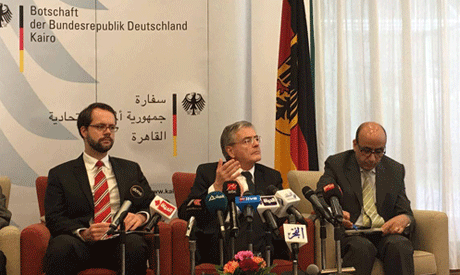
File Photo: Germany's ambassador to Egypt Julius Georg Luy during a press conference ahead of German Chancellor Angela Merkel visit to Cairo (Photo: Menna Alaa El-Din)
The German embassy in Cairo welcomed on Friday the first step in allowing German civil society organisations to resume activities in Egypt, after a bilateral agreement was signed in Berlin to that effect.
German ambassador in Egypt Julius Georg Luy hailed the agreement, describing it in a statement on e-mail as "an important first step" and said he hoped that the agreement goes into effect as soon as possible to enable German institutions to resume their work without obstacles, and for the benefit of the two countries.
The agreement is considered an additional protocol to the cultural agreement between the two countries, in effect since 1959, and represents a legal framework for the work of the German institutions in Egypt, once ratified by both sides.
It was signed in Berlin by Philipp Ackermann, the German foreign ministry’s delegate for Middle Eastern Affairs, and by Egypt’s ambassador Badr Abdel-Ati.
The statement adds that it is also a first step towards solving the case of two employees of the German NGO Konrad Adenauer Foundation who were sentenced in absentia in 2011 for crimes related to receiving foreign funds.
Further details of the agreement have not been announced.
The situation of German organisations in Egypt was on the agenda of Chancellor Angela Merkel during her visit earlier this month, the statement reads, adding that Merkel said that organising a legal framework for the work of the organisations will allow individual legal cases from the past to be looked at, and create opportunities for bilateral cooperation.
The statement added that German political organisations are close to German political parties; however, they receive their funding from the German public treasury, according to the Bundestag regulations, and are independent from the German government when it comes to their programmes.
These organisations work on political education inside Germany, and since 1961 they have worked on enhancing cooperation and dialogue at an international level, which means communicating with governments, unions, and civil society outside Germany.
Egyptian prosecutors investigated charges of receiving foreign funds illegally in 2011, investigating a number of NGOs. Fourteen Egyptian and 29 foreign aid workers faced trial for receiving illegal foreign funding and for working without a formal licence.
Twenty-seven defendants, all tried in absentia, received five-year jail sentences, eleven received one-year suspended sentences, and five received two-year sentences.
The court also ordered closure of five foreign NGOs operating in Egypt and funds were confiscated: the US-based Freedom House, the International Republican Institute, the National Democratic Institute, the International Centre for Journalists, and Germany's Konrad Adenauer Foundation.
The case was reopened again in March 2016. A number of prominent activists being investigated in the case have since been banned from travel, and the assets of those named in the case have been frozen.
Merkel met with President El-Sisi and other Egyptian top officials during a short visit in March, where they discussed cooperation between both countries in combating terrorism and irregular migration, and promised $250 million to support the country's economic reform programme.
The German news website Deutsche Welle reported on 2 March that Merkel said that Cairo agreed to easing restrictions on political foundations after her meeting with El-Sisi, saying that "Germany's political foundations are in our opinion a very important contribution to the development of civil society."
Short link: